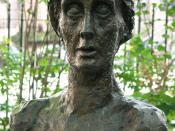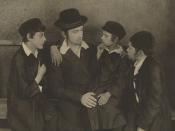Reaching Mrs. Brown: Interiority and Typification
'Character', wrote Arnold Bennett, 'is at the heart of the novel'; yet Virginia Woolf in her essay Mr. Bennett and Mrs. Brown responded that Bennett's attempts at characterisation were pre-occupied with physical surroundings; his hunger for material description left his characters bare. Taking as her example a putative Mrs. Brown, elderly, destitute, proud and afraid, she proposes that Bennett would, in describing her, intricately and skilfully depict the carriage, the bulging of the upholstery, and the advertisements whilst leaving Mrs. Brown herself unexplained. She writes that Bennett, whom she goes on to say describes his characters by sketching their houses, believes that 'Old women of course ought to be made of freehold villas and copy estates, not of the imagination.' Character, says Woolf in her essay, changed irrevocably before the War, and a concomitant change in style of writing is necessary to reflect this.
'Life' says Woolf of Bennett's unsatisfactory writing, 'escapes.'
Going on to call for new modes of expression to reflect this new 'character', in Mr. Bennett and Mrs. Brown, and also in Modern Fiction and The Narrow Bridge of Art, she says that in order to portray interiority as thoroughly and fully as they wish, 'Grammar is violated, syntax disintegrated' by the Georgian writers. She goes on; 'Mr. Joyce's indecency in Ulysses seems to me the conscious and calculated indecency of a man who feels that in order to breathe he must break windows.' She asks, dramatically, for a 'smashing and a crashing.' of literary convention. E.M. Forster agreed with her diagnosis of the paradigm shift in character, saying that psychology had 'split and shattered the idea of the Person' and D. H. Lawrence similarly concurred, rejected what he called 'the old stable ego of character', joining...


